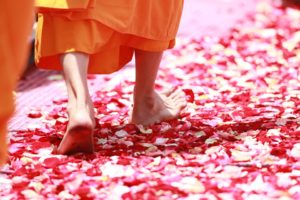The noble eightfold path is not just eight steps for a Buddhist but it is eight parts of a Buddhist’s life. Each of these eight parts can be sectioned into either:
Wisdom (Right understanding/view, Right intention/ resolve),
Morality (Right speech, Right action, Right livelihood),
Meditation/ mental Training (Right effort,
Right mindfulness, Right meditation/ concentration.
These aspects of the eightfold path can have huge implications on the life of a new Buddhist.
Right understanding
For the right understanding, right view, a Buddhist would have to have read and accepted the teachings of the Buddha, this means the Buddhist would have to put aside time to read and study the teachings of the Buddha. The implications of this would be that the Buddhist would have to go to bed later or to make time by giving up an aspect of their previous lives. A Buddhist would have to give up their previous thoughts on many subjects and accept those of the Buddha. For some, this could take a lot of time and effort.
Right intention/resolve
The second aspect of the noble eightfold path is the right intention/resolve. This would mean not only reading an understanding of the teachings of the Buddha, this means putting it into practice into their day to day lives.
 The impact this would have on a Buddhists daily lie is that they would have to make a serious commitment to making the right decisions for the right reasons for some this could mean giving up on drug addictions and other cravings such as greed, lust and things that would go against the teachings of the Buddha.
The impact this would have on a Buddhists daily lie is that they would have to make a serious commitment to making the right decisions for the right reasons for some this could mean giving up on drug addictions and other cravings such as greed, lust and things that would go against the teachings of the Buddha.
Right speech
The third aspect of the eightfold path and the first in the morality section is the Right speech. This would affect a Buddhist in his or her daily lives by meaning they would have to refrain from using foul language or swearing and other obvious things. However, they would also have to refrain from harsh words, lies, gossip and idle chatter, as all these can lead to suffering and hurt for someone else. This could mean an entire change of lifestyle or fighting against what has sometimes become a habit. A Buddhist must tell the truth in a nice way that is thoughtful to other people, promote peace and harmony and value silence.
Right action
The fourth aspect of the noble eightfold path is the right action. This would mean that a Buddhist would have to refrain from wrong bodily behavior such as killing or harming another living being.
 To a new Buddhist, this would be a difficult thing to apply to his or her own lives, he or she would have to give up eating meat and become a vegetarian. This would mean abstaining from stealing and misuse of the senses, stealing is causing suffering to somebody else due to the lack of what has been stolen, abstaining from misuse of the senses does not necessarily mean remaining celibate for a Buddhist who has slept around in the past this would mean not sleeping around therefore only having sex when in love or when you have been together long time.
To a new Buddhist, this would be a difficult thing to apply to his or her own lives, he or she would have to give up eating meat and become a vegetarian. This would mean abstaining from stealing and misuse of the senses, stealing is causing suffering to somebody else due to the lack of what has been stolen, abstaining from misuse of the senses does not necessarily mean remaining celibate for a Buddhist who has slept around in the past this would mean not sleeping around therefore only having sex when in love or when you have been together long time.
Also, a Buddhist should not tell lies or cloud their minds with intoxicating substances, this does not just mean that you should not do drugs this also includes alcohol and smoking. Many Buddhists may have been drug addicts or alcoholics before having become Buddhists for them the implications of this would be having to fight their addictions and fight through any withdrawal symptoms they might have.
Right livelihood
The fifth aspect of the noble eightfold path is right livelihood, this means living life that is fair and honest and that does not violate one’s beliefs, or be in an occupation that harms others. If a butcher or a drug dealer became a Buddhist the implications of this would be giving up their job for an on that doesn’t violate this aspect of the eightfold path.
Right effort
The sixth aspect of the noble eightfold path is the right effort this is also the first in the meditation/mental training. The effect of this on the everyday life of a Buddhist is that a Buddhist would have to control his or her thoughts and putting aside all negative thoughts and replacing them with good thought this may also include character traits. Positive thoughts produce positive action.
Right mindfulness
The seventh aspect of the noble eightfold path is right mindfulness. This means cultivating constant awareness of one’s body, feelings, and thoughts, with a view to having more control and knowledge over and about them.
Right meditation/concentration
The eighth aspect of the noble eightfold path is Right meditation/concentration. The effect this would have on a Buddhist would be having to put aside time to develop deep new levels of mental peace and calm. A Buddhist gradually goes into deeper states of meditation before achieving nirvana.





